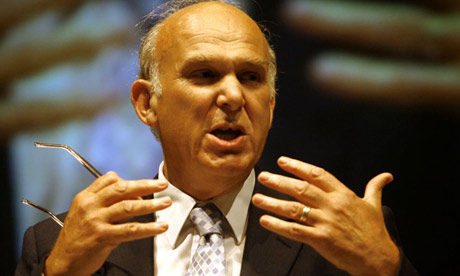
Locust
Vince Cable’s efforts to keep the Royal Mail in the hands of “blue chip investors” and away from “spivs and speculators” was delivered a blow this week when it emerged that the Children’s Investment Fund has taken a 5.8 per cent stake in the company following its privatisation earlier in the month.
The fund was founded by Chris Hohn, described as a “locust” by German politicians, and damned by the former CEO of Deutsche Börse, Werner Seifert, for his part in scuppering a previous business deal.
The London-based hedge fund has bought 58.2m shares or 5.8pc of Royal Mail. Under stock exchange rules, TCI had to declare its stake when it reached 5pc of the company. The threshold was reached on Friday.
Mr Cable has often criticised hedge funds for being short term investors and has repeatedly insisted that Royal Mail would be sold only to “long-term, blue chip” institutional investors.
Meanwhile Chancellor of the Exchequer George Osborne has responded to criticism that the government had sold off the Royal Mail too cheaply.
At a Thomson Reuters Newsmaker event on Tuesday, he told his audience that initial public offers are routinely offered at a discount and the government had followed advice from its bankers on details of the sale.
“On all fronts it has been a great success,” he said.
Bargain basement
And in the House of Lords, Labour peer Lord Sugar, star of TVs The Apprentice, questioned the expertise of the banks which had been advising the government on the sale.
He demanded: “Why did these so called experts sell the stock at such low levels and get it totally wrong to such an extent that the stock rose by 33 per cent the day afterwards and since then 54% on the issue price?
“Bearing in mind other reputable banks had come on record giving a valuation of £5 billion, why were these banks ignored and what will you be doing by way of an inquiry in finding out who the lucky institutions were that underwrote this bargain basement sale?”
Government spokesman Lord Popat said the key objective had been to “secure value for money for the taxpayer”.
Pressed by Labour’s Lord Donoughue on the level of fees paid to the banks, Lord Popat said: “The underwriting banks will share a maximum fee of 1.2 per cent of the IPO receipts or £16.9 million. This maximum includes a potential discretionary fee of £4.2 million. The actual fee will be finalised shortly. Lazards will receive £1.5 million as the Government’s independent adviser.”
For those of you without a calculator, it means that three banks, UBS, Lazards and Goldman Sachs, share £18.4 million between them.
Markets
Of course, the usual reasoning behind the sale of the company, is that it would allow the Royal Mail access to the financial markets; but, you have to ask, what would have stopped the Royal Mail accessing the markets as a publicly owned company? The answer, it seems, is “very little.”
According to a letter in the Guardian prior to the Royal Mail’s flotation it “is purely the Treasury’s insistence on keeping to the UK’s unique borrowing rules, which are not followed by any other country.” The government-owned French energy company EDF, and the German transport company Arriva, have no such limitations, and operate freely in the UK. The Royal Mail was already classified by the Office of National Statistics as a public corporation and could have enjoyed the same freedoms as state-owned companies elsewhere in Europe. All that was needed was for the Treasury to adopt the same rules as other countries have had for decades.
The writer, John Perry, adds: “It continually surprises me that opponents of Royal Mail privatisation have not pursued this argument, especially as it addresses one of the government’s main arguments in favour of selling it off. Given that the government have already made a similar rule change in favour of the publicly rescued banks, there is a clear precedent for such a change in favour of Royal Mail.” This would have rendered privatisation unnecessary, he says.
In other words, it’s one law for the banks, and another for the Royal Mail.
